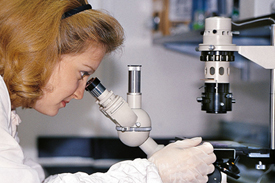Key points
- Laboratory testing is required to diagnose rubella and determine past infection or immunization status.
- Rubella IgG serology testing should be used for assessing rubella immunity.
- Detection of rubella RNA in a clinical sample can provide laboratory confirmation of infection.

Types of tests
Serology testing:
Rubella IgG serology testing should be used for assessing rubella immunity, including before, during, and after pregnancy.
Rubella IgM testing should be limited to suspected rubella cases; it is not recommended for screening asymptomatic people.
RNA detection:
Methods of rubella RNA detection include RT-PCR and virus isolation. For acute rubella cases, viral specimens should be collected as soon after symptom onset as possible.
Specimen collection
CDC's Infectious Disease Laboratories provide guidance on rubella specimen collection, storage, shipment, and points of contact for each test. Nasopharyngeal swabs, throat swabs, and urine samples from CRS cases should be collected as close to birth as possible.
Submitting specimens
The State Public Health Laboratory (SPHL) refers serum and/or viral samples to CDC for rubella testing, usually for confirmatory testing. Certain circumstances require that initial testing be done at CDC.
